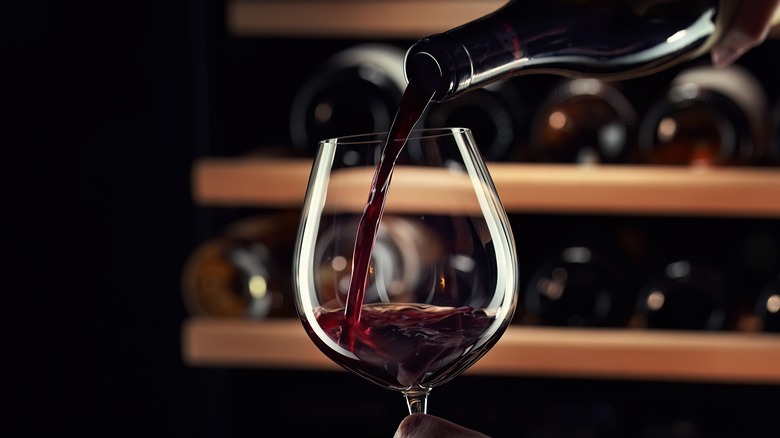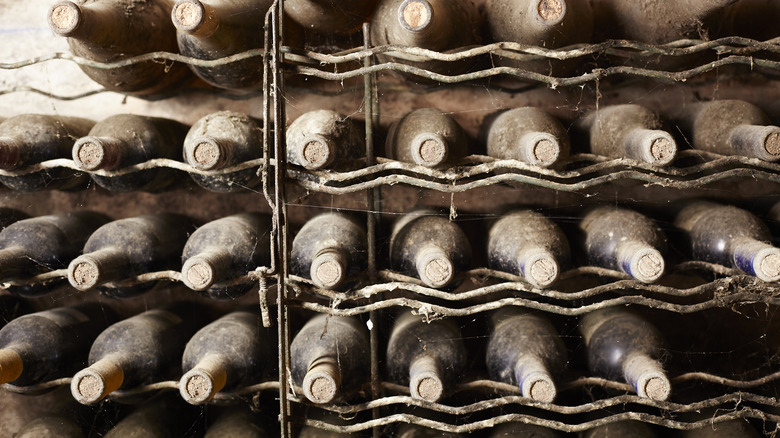Here's How Long Unopened Red Wine Will Last
Some wines improve with age, it's true — but every wine has a lifespan, and they vary depending on factors like grape varietal, alcohol content, and tannin strength. Most wine is made to be consumed young, either immediately or within a few years of bottling. Red wines have longer lifespans than most white or rosé wines because the tannins act as a natural preservative. Wines with higher tannic content like big, bold reds will generally age better than light reds and white wines (though there are exceptions, like soave and chardonnay).
An average bottle of red wine can age for between two and 10 years. A lighter wine like a gamay, pinot noir, carménère, or grenache — or wines that may use those grapes, like a Beaujolais or Spanish "red blend" — should be opened and enjoyed within two years of bottling. As the body, tannin structure, and viscosity of the wine increases, so too does its aging potential. A Syrah, zinfandel, malbec, Nebbiolo (like a Barolo), or a Bordeaux blend containing merlot, and cabernets franc and sauvignon could be aged for up to 10 years, maybe longer. Wine Folly has a helpful chart that can serve as a guide.
Some very high-quality wines of those bolder grapes are made with the intention of long-term aging. It's said that only 1% of wine is made to be aged longer than 10 years; it's likely that if you're buying a bottle that can withstand decades in a cellar, you know it.
What does aging do to wine?
Aging wine can help develop flavor and texture into something more pleasurable to drink. Think about the last time you decanted a bottle of wine or let it breathe: As the wine oxidized a bit, it opened up. The tight, acidic, tannic, alcohol-heavy first taste likely bloomed into something smoother on the tongue with layers of flavor. That's a snapshot of what aging can do for wine.
As wine ages, the oxygen in the neck of the bottle continues to slowly and minimally oxidize the wine. The acetic acid created by this oxidation and the acidity in the grape juice continue to react with the alcohol to create new flavor compounds. If you bought a case of wine and opened one bottle every year, there would likely be new tasting notes with each bottle — even though it was the same wine. Fruity primary and secondary notes in young wine will become earthier tertiary notes as it ages. If you ever heard that malbec, merlot, or cabernet sauvignon should have notes of cigar box and tobacco leaves but all you get is black stone fruit, it's likely the age.
Texturally, aging helps wine become smoother. Those tannins, natural polyphenol compounds found in the skins, seeds, and stems of wine grapes that help give wine body, begin to fall out as sediment over time. A wine that is a bit rough on the tongue while it's young can smooth out over time, becoming soft and velvety.
How do you know if a red wine has aged too much?
Wine can sour or stale if it over-ages or if it's stored improperly, but it isn't a food safety concern; it just tastes bad. First, look for signs of improper storage — namely, cork damage. If the cork has cracked, you know the wine has been compromised. If you can see evidence of leakage, like staining on the outside of the cork, that can be an indication of this, as well. If all looks well, it's time to open it up, smell it, and taste it.
Pour a little in a glass and hold it over a sheet of white paper. If it's very brown, it's likely over-aged. Overly oxidized wines can develop cardboard, wet dog, or even varnish notes on the nose.
Poorly stored wine with a cracked cork can fall victim to cork and bacterial taints. Cork taint can be a result of fungal must or a microbial compound and will make the wine smell and taste moldy. Wine might not be a food safety concern if it goes off, but bacterial infections can make it smell like band-aids, cough syrup, rubber, mothballs, or horses. If your wine smells like any of these things, it's probably best not to drink it. Much of what you taste comes from what you smell, and those smells just won't taste good.
Ultimately, wine is made to be enjoyed. If you're worried about the wine you're aging, it might be time to drink it.


